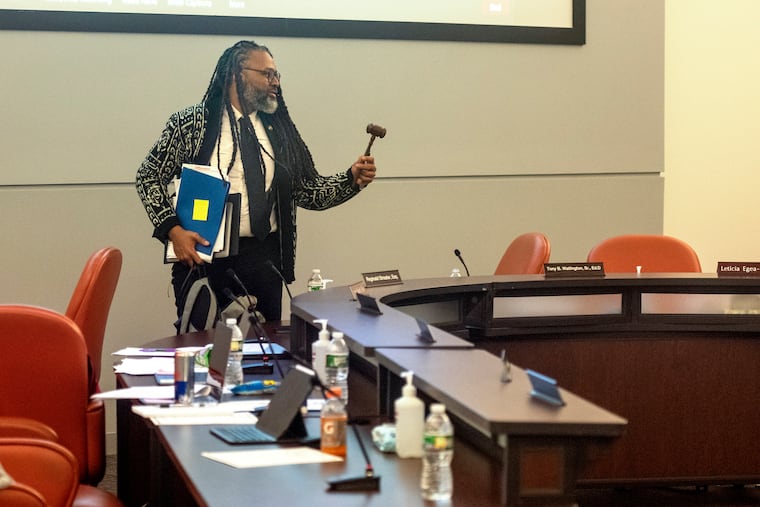Big changes for the Philly school board, with a new president and vice president elected
Reginald Streater, a lawyer and school board member for nearly two years, was elected president Thursday night to lead the board.

For the first time in its reconstituted history, the Philadelphia school board has a president who is not Joyce Wilkerson.
Reginald Streater, a lawyer and school board member for nearly two years, was elected president Thursday night. Wilkerson signaled that after many years at the helm of the 115,000-student district’s governing body, it was time for new leadership. She remains a school board member.
“I think I was the right person to get us to this point,” said Wilkerson, who nominated Streater and endorsed him effusively. “I don’t think I’m the right person to take us forward.”
Wilkerson, a Temple University administrator who was chief of staff to Mayor John Street, spent nearly six years as chair of the former School Reform Commission and board president. (She briefly resigned from the SRC in order to be eligible to join the school board.)
On Wilkerson’s watch, the district was able to shake off 17 years of state control.
The board also has a new vice president: Leticia Egea-Hinton, a retired social worker and homeless advocate who ran the superintendent search that resulted in the district’s hiring Tony B. Watlington Sr., was replaced by Mallory Fix-Lopez. Fix-Lopez, 38, is an educator and district parent who has been part of the board since its establishment in 2018.
Both Streater and Fix-Lopez are district parents and Temple University graduates. Streater graduated from Leeds Middle School and Germantown High, and recently traveled to Finland and Kenya as an Eisenhower fellow, gaining new perspectives on ways to improve public education.
Streater, 39, said his district education sustained him through life challenges and springboarded him to his current roles.
“I am deeply appreciative, honored, and humbled by the opportunity to be the president of the Philadelphia Board of Education,” Streater said.
Streater was unanimously elected; Fix-Lopez won the vice president’s job over Lisa Salley, seven votes to two.
“I really truly hope that this vote does not lead to fractures that keep us from doing our best work,” board member Chau-Wing Lam said.
All board members are appointed by the mayor; their terms run concurrently with the mayor’s.
The leadership shift comes just after Wilkerson was awarded a lifetime achievement prize from the Council of Urban Boards of Education.
In an interview, she said returning the district to local control was a central point of pride. The district in the years before Wilkerson came to the board was a financial mess, hamstrung by state cuts and other woes. Once it returned to more stable footing and showed three years of balanced budgets, abolishing the SRC became a possibility.
“I’m really proud of that work,” said Wilkerson. She also steered the board toward a tighter focus on student academic achievement — a study of SRC history showed that it spent just 10% of its time on what is nominally its chief purpose. “Goals and Guardrails” represented a shift in the way the board did business.
In a district as distressed as Philadelphia has been — financially and academically, with 35% of district students meeting state standards in reading and 21% reaching benchmarks in math — the framework “brought clarity to a situation that is fairly chaotic,” Wilkerson said.
“We have a lot of inequity in the kind of education we make available to students,” said Wilkerson. “We have ongoing financial challenges, and it’s hard to orient yourself in a situation like that. The tough issues are still out there, but it’s helped us focus, and if we’re not focused, it’s hard for the district to be focused.”
With 216 schools and a $4 billion budget to manage, the work often seemed endless, Wilkerson said. (And it’s unpaid — all school board members are volunteers.) But visiting schools was a balm, a reminder of why she did the work and what the stakes were.
And yes, even when she kept an impassive face while listening to hours of public testimony — and taking heat from some members of the public for trying to limit public testimony, or worse — she is listening, Wilkerson said.
“There are certain conversation where people brought issues to us that are really kicks in the gut — have just been excruciating to hear,” said Wilkerson. The meeting where a parent talked about his child getting an electric shock at school because of poor building conditions comes to mind; so does the time when a student who was a recent immigrant brought his concerns to the board. He had been asking for help resolving a problem and kept hearing, “We’re doing our best.”
“He said, ‘Your best is my worst nightmare,’” Wilkerson said. “That’s not easy to hear.”
Wilkerson, who lauded her fellow board members and the behind-the-scenes work of the board staff, said the board still has a lot “we have to get right,” namely, its looming facilities planning process. (The district has hundreds of aging buildings and about $5 billion in unmet capital needs; Watlington recently put the master planning process on hold until he finalizes an academic plan.)
Her sleeves, Wilkerson said, are still rolled up.
“We have students out there who are really wonderful, who have big dreams and are putting in the time and the energy,” Wilkerson said. “We adults have to align the resources that we do have to help them make their dreams come true.”